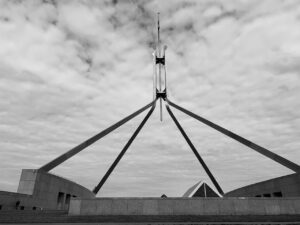Once upon a time in Australia, the best and the brightest presented themselves for election. Now, it seems, Cabinet ministers are chosen on the basis of loyalty to whoever is sitting in the prime ministerial chair. And talent is in short supply.

Many had had glittering careers elsewhere and were ready to give something back to the Commonwealth. Some were from less elevated walks of life, but were filled with a fervour to ‘do good’.
Upon election, as a general rule, it usually took them some time to show what they were made of, and gradually those with the best minds, and the greatest capacity, worked their way up through the ranks. In political life that has always meant attaining ministerial appointment. If one were unfortunate enough to be seated on the ‘wrong’ side of the chamber, one gained shadow ministerial experience.
Often the Minister, and his or her shadow, continued in the same portfolio, over a period of years. Each became an expert in that area. For example, when the electorate voted for change, the Shadow Minister was able to step into the ministerial role almost seamlessly, and often with shared goals. That approach was known as bi-partisanship.
This illustrated the maxim that the Cabinet was there to serve the country, rather than the party. In the best of times, the Minister and his or her shadow were able to work together, with the goal of improvement the country as a whole. This came to an end with the Howard Government.
How did Howard change things?
To many Australians, John Howard was known as honest, earnest and relatively harmless. But that persona was carefully crafted. His Government was described as ‘mean and tricky’ in a report Howard commissioned, from the Liberals’ then party president, Shane Stone. Howard was on a mission in 1996 to re-make Australia into a faux Thatcherite society, and he used the oldest trick in the book – a ‘budget emergency’.
Serving as a beacon to Tony Abbott in 2013, Howard ‘manufactured’ a budget emergency, and embarked on a ruthless project to rid his government of debt by selling off the country’s silver and imposing strict savings on reluctant ministers.
Some of the more notable pieces of silver were Telstra, the Commonwealth Employment Service and the aged care sector. The damage these own goals have caused has cascaded throughout the years and continues to cause the country to bleed.
But it served Howard in two ways. First he engineered “cabinet solidarity” on solving the ’emergency’, thus mandating even unreasonable savings, and he isolated the so-called ‘wets’, many of whom fought for funding for their portfolios.
‘Wets’, another term for moderates, generally believed in a type of humanistic Conservatism, where they achieved economic goals while protecting the poor. Some of his best performers were either sidetracked or actively removed from the parliament, through selective targeting.
The party is of course now stacked with time-serving, narrow, ideologically motivated drones, whose life experience is usually having served as an ‘adviser’ to a parliamentarian hack, or as a lawyer. That does not deepen the gene pool, but it does provide malleable cattle with which to work.
What happened to bi-partisanship?
Cabinet ministers are now chosen on the basis of loyalty to whoever is sitting in the prime ministerial chair. Talent is in such short supply that someone like Michaelia Cash, a former lawyer, is now a cabinet minister. Her portfolio area is Employment, Skills, Small and Family Business. With her unreasoning loathing for all things union, who could she work with from across the aisle? And, working at a major law firm, as a taster for small business?
Angus Taylor, a former Rhodes Scholar, has worked as a management consultant for 20 years or so. He must know about risk management, or he would not have been employed in management consulting. And yet, in possibly the most important role he will ever be employed in, that of reducing Australia’s emissions in a pre-apocalyptic world, he adheres to the anti-science rhetoric and apparent obfuscations of a global heating denialist. The only possible explanation is that he is unable to read a risk profile, or he cannot escape the shackles of his denialism.
Melissa Price MP was Vice President of Legal and Business Development for Crosslands Resources, an iron ore miner, before she was appointed to the Environment Ministry. As Peter Fitzsimons asked on television, “If a million dead fish at Menindee doesn’t attract your attention as the environment minister, what does it take?”
She also approved the Adani Mine’s groundwater plan just days before the 2019 election, although the plan was riddled with errors. It puts her in line, along with Greg Hunt and Josh Frydenberg, to contest the Worst Environment Minister in History Award.
Was the Prime Minister joking with these appointments?
One theme runs through this tiny sample of ministerial misfits. It can be read as being the best we can do, with a shallow pool from which to pick, or did Morrison actually choose ministers who would so underperform that he could show his contempt for the very areas they represent.
Considering the IPA obsession for small to no government, could this be, like Trump’s, a new low in ministerial commitment, as we head to low-to-no regulation and really ugly capitalism?
Politics has been called, unkindly, show business for ugly people, but it should not be taken so lightly. Politics is a deadly serious undertaking because it has real, tangible consequences. That is why it constantly surprises me that politicians think they have some form of a pass – that they will not be judged for their actions. Because their decisions often have real-world consequences.




